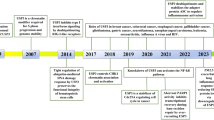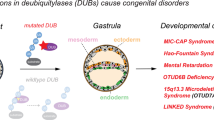Abstract
The homeostasis for a number of cellular proteins is regulated by not only phosphorylation and dephosphorylation, but also ubiquitination and deubiquitination. A number of proteins involved in the degradation of polypeptides have been isolated in various eukaryotic organisms from Saccharomyces cerevisiae to human. Recently, several deubiquitinating enzymes, classified into either the Ub C-terminal hydrolase (UCH) or the Ub-specific processing protease (UBP), have been reported. It has been shown that they contain conserved domains including Cys, His, and Asp residues throughout the enzyme. These proteins have been demonstrated that Cys and His domains are critical for deubiquitinating enzymatic activity. Recently, we have shown that the Asp ___domain localized between Cys and His domains is also essential for cleaving the ubiquitin from protein substrates. Mouse deubiquitinating enzymes including DUB-1, DUB-2, and DUB-2A have been isolated and they showed the expression specificity. Of these, DUB- 1 and DUB-2 are expressed in lymphocytes depending on the presence of cytokines (interleukin-3 in B-lymphocytes and interleukin-2 in T- lymphocytes, respectively), indicating that they are involved in cytokine signaling pathways. Isolation of all putative DUBs will help to identify their substrates and to regulate the homeostasis of cellular proteins, especially in proliferative cells.
Similar content being viewed by others
Article PDF
Author information
Authors and Affiliations
Rights and permissions
This is an Open Access article distributed under the terms of the Creative Commons Attribution Non-Commercial License (http://creativecommons.org/licenses/by-nc/3.0/) which permits unrestricted non-commercial use, distribution, and reproduction in any medium, provided the original work is properly cited.
About this article
Cite this article
Baek, KH. Conjugation and deconjugation of ubiquitin regulating the destiny of proteins. Exp Mol Med 35, 1–7 (2003). https://doi.org/10.1038/emm.2003.1
Published:
Issue Date:
DOI: https://doi.org/10.1038/emm.2003.1
Keywords
This article is cited by
-
MF-094 nanodelivery inhibits oral squamous cell carcinoma by targeting USP30
Cellular & Molecular Biology Letters (2022)
-
HucMSC exosomes promoted imatinib-induced apoptosis in K562-R cells via a miR-145a-5p/USP6/GLS1 axis
Cell Death & Disease (2022)
-
Annexin-1 regulated by HAUSP is essential for UV-induced damage response
Cell Death & Disease (2015)
-
Ubiquitin-specific proteases as therapeutic targets for the treatment of breast cancer
Breast Cancer Research (2014)
-
Transcriptomic profiling of proteases and antiproteases in the liver of sexually mature hens in relation to vitellogenesis
BMC Genomics (2012)



